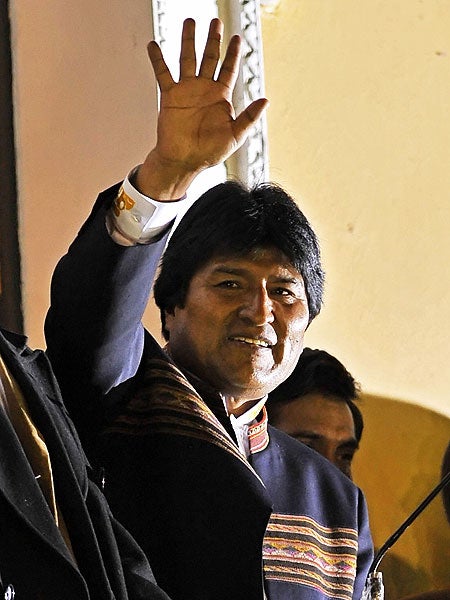Bolivians strongly back Morales in referendum

Your support helps us to tell the story
From reproductive rights to climate change to Big Tech, The Independent is on the ground when the story is developing. Whether it's investigating the financials of Elon Musk's pro-Trump PAC or producing our latest documentary, 'The A Word', which shines a light on the American women fighting for reproductive rights, we know how important it is to parse out the facts from the messaging.
At such a critical moment in US history, we need reporters on the ground. Your donation allows us to keep sending journalists to speak to both sides of the story.
The Independent is trusted by Americans across the entire political spectrum. And unlike many other quality news outlets, we choose not to lock Americans out of our reporting and analysis with paywalls. We believe quality journalism should be available to everyone, paid for by those who can afford it.
Your support makes all the difference.A bold gamble by President Evo Morales to break a political deadlock and re-energise his leftist revolution paid off as Bolivia's voters resoundingly endorsed him in a recall referendum.
More than 63 per cent of voters in this bitterly divided Andean nation ratified the mandate of Bolivia's first indigenous leader and his vice president, Alvaro Garcia, in yesterday's vote, according to partial unofficial results.
Eight of the country's nine governors were also subject to recall — and two Morales foes were among the three ousted, according to a private tally of votes from 1,000 of the country's 22,700 polling stations.
Morales had sought the referendum to try to topple governors who have frustrated his bid to improve the plight of Bolivia's long-suppressed indigenous majority, which is concentrated in the country's barren western highlands.
His leftist agenda has met with bitter opposition in the landlocked country's unabashedly capitalistic east, where protesters who accuse him of being a lackey of Venezuelan President Hugo Chavez blockaded airports last week to keep Morales and his ministers from touching down for campaign visits.
All four governors there easily survived Sunday's plebiscite, as expected.
But Morales did surprisingly well in those states. In one, Pando, he was endorsed by 51 percent of voters, while he won 40 percent approval or better in the other three, according to the vote tally by the Ipsos-Apoyo firm for the ATB television network.
First official returns representing a fifth of the vote and posted on the national electoral court's Web site early Monday showed Morales confirmed in his job with 52 percent. Rural areas where Morales has greater support tend to report more slowly than cities.
"What happened today is important not only for Bolivians but for all Latin Americans," Morales told several thousand cheering supporters Sunday night from the balcony of the presidential palace in La Paz. "I dedicate this victory to all the revolutionaries in the world."
As supporters chanted "firm hand," urging him to get tough with his lowland rivals, Morales instead extended them a hand. He called on all the country's governors to work with him "for the unity of all Bolivians" — especially in fighting extreme poverty.
The 53.7 percent that Morales received in winning office in December 2005 had been the previous best electoral showing for a Bolivian leader.
The Aymara politician has since nationalized the country's natural gas fields and main telephone company, but the opposition has stymied his attempts to seize fallow eastern lands from wealthy estate holders and give them to impoverished Indians.
Morales has also been unable to get a date set for a nationwide vote on a new constitution that would give indigenous groups more power and allow him to be re-elected to a second five-year term. The opposition walked out of the constituent assembly that wrote the document.
On Sunday, Morales gained with the defeat of opposition governors in the highland province of La Paz and in Cochabamba, seat of his coca-growers movement. An allied governor was ousted in the highlands province of Oruro.
Morales can now name interim governors pending provincial elections.
But that doesn't mean Bolivia is entering a new era of reconciliation.
Cochabamba Gov. Manfred Reyes, a conservative three-time presidential candidate, refused to step down, calling the referendum unconstitutional. Bloody street clashes broke out in the province last year when Morales supporters tried to oust Reyes.
And Gov. Ruben Costas of Santa Cruz, the soy-growing lowland center of resistance to Morales, proclaimed Sunday's outcome "a defeat for centralism." He said his province would proceed with creating its own police force and call elections for a provincial legislature.
Santa Cruz was the first of four provinces including Beni, Tarija and Pando to declare themselves autonomous this year in what have so far been largely symbolic moves.
Last week, the mayor of its eponymous capital, Percy Fernandez, last week called on the military to overthrow Morales' "useless government."
The wealthier eastern provinces have resisted Morales' insistence that the central government control energy profits and decide how to distribute them.
Natural gas and precious metals revenues have boomed since Morales nationalized the gas fields in 2006 and renegotiated extraction contracts.
Bolivia now keeps about 85 percent of these profits, and combined with rising global energy and mineral prices, exports have nearly doubled since 2005 to US$4.7 billion last year.
Chavez personally called and congratulated Morales on Sunday night and would "continue to accompany (his) democratic and cultural revolution," Venezuela's foreign minister said in Caracas.
Oil-rich Venezuela has given Bolivia tens of millions of dollars and Morales' government announced Saturday that Venezuela and Iran were providing loans totaling up to US$230 million to help it build two state-owned cement plants in the Andean highlands.
Join our commenting forum
Join thought-provoking conversations, follow other Independent readers and see their replies
Comments